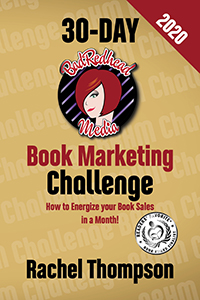How Much Money is Enough to Make from Your Writing? by guest @colleen_m_story
When asked how much money they want to make from their writing, most writers would probably say,
“As Much As Possible!”
But there are consequences to that answer that you may not have thought about. Being more precise about your desired writing income can make the difference between enjoying a long and successful career and burning out far too soon.
Why Money Matters to Writers
The first question a writer must ask is: “Why do I care about making money with my writing?”
Of course, all writers are happy to make money with their work, but for some, this desire can hinder their efforts to reach their goals. Let’s say your last book didn’t earn as much in sales as you hoped. How did that affect you? Did you wonder if your work wasn’t good enough? Did the lack of income make you question whether you should keep writing?
If you answered yes to either of these questions, it’s worth examining why.
Society Can Influence Writers to Value Money Above All
A national survey found that more Americans, when asked what they valued most in life, answered “money” than “friendship” or “religion.” Another survey by finance recruitment firm Accounting Principles found that given the choice between an extra week of vacation and a 5 percent increase in salary, nearly 80 percent of respondents chose the higher salary.
It’s easy to understand why more money may be preferable for those who are earning little, but the results held even among those who were earning high incomes.
Because of our culture’s focus on money, writers can often feel pressured to justify the time they spend writing with a certain level of income. We may worry that without significant royalties to show for our efforts, our writing lacks value.
Meanwhile, it’s easy to overlook all the many other benefits we gain from writing—how it allows us to express ourselves, escape into another world, and even heal from trauma. Focusing solely on whether we’re making money can shortchange us of all these other benefits while leading to self-doubt and discouragement.
So back to our original question: Why does making money from your writing matter? If in answering the question you find that you’re trying to justify what you’re doing according to society’s standards, it may be time to reexamine your motives.
How Much Money Is Enough to Make from Writing?
Once you’ve determined a clear reason why it matters to make money with writing, then the next question you need to ask is: “How much money is enough?”
It’s necessary to answer this question for a couple of reasons:
- It gives you a specific goal to shoot for.
- It saves you from the “no amount is ever enough” trap.
When you set a monetary goal, you give yourself a specific benchmark against which to measure your results. This is important in both freelance and book writing, as without a goal, you’re left swaying back and forth between feeling like you’re doing okay with your earnings and berating yourself because you could be doing better.
Be careful when determining this goal that you don’t set yourself up for failure. A small goal reached is always much more motivating than a large goal never attained. You want to keep your energy high as you go after your writing goals, so forget about the “go big or go home” idea, and consider setting a goal that’s only say, 10 percent higher than whatever you earned last year, even if that amount was $1.
What’s Your Money Goal? An Exercise
If you’re writing books and you have yet to earn much from sales, again, be sure to set the bar low. Keep in mind factors like the following:
- How many books you’ve published so far (expect earnings to increase with each release).
- Whether this book is part of a series (subsequent books in a series tend to sell better if the series has an audience).
- How much marketing you plan to do (be realistic).
- Your author platform (how many readers are already interested in what you’re doing).
Go through each of these points and write down your answers. This will not only give you a way to come up with a smart and motivating goal but will also remind you of the steps you need to take to reach that goal.
Set Yourself Up for Writing Success
All of us have been disappointed with our earnings at one time or another. Too often we tend to get down on ourselves and assume these results signify that our writing is not good enough.
Instead, examine your situation, what you are willing to do to improve it, and then set your goal and go after it. You’ll be much more likely to achieve it than if you simply hope for grand results to come your way.
Note: For more on determining whether writing is part of your life’s purpose, see Colleen’s new book, Your Writing Matters: How to Banish Self-Doubt, Trust Yourself, and Go the Distance. Get your free chapter here!

Sources
Americans Value Money More Than Friendship, Survey Reveals
Gander, Kashmira.
Newsweek. Last modified November 23, 2018.
Americans Are Becoming Less Happy, and There’s Research to Prove It
Ingraham, C.
The LA Times (2019, March 23)
Americans Value Money Over Time Off
Lucas, Suzanne.
CBS News. Last modified February 28, 2014

Colleen M. Story ‧ Author
In her new release, Your Writing Matters, Colleen M. Story helps writers determine whether writing is part of their life’s purpose. Her other books for writers have been recognized in the Reader’s Favorite Book Awards and Reader Views Literary Awards, and her last novel was a Foreword Reviews INDIES Book of the Year Awards winner. Find more at her author website or connect with her on Twitter.
For a more detailed plan on developing your book marketing, purchase Rachel’s new book,
The BadRedhead Media 30-Day Book Marketing Challenge
Now on Amazon!
Readers’ Favorite Silver Award Winner!
Have you signed up for my newsletter yet?


As someone who is relatively new to the game, with my third book just releasing this month, I admit that I haven’t given these money questions much thought. I am scrambling daily to improve my marketing game but I’ve never really set a goal. You have left me pondering what is realistic…
It can help to consider it, Naomi, so that any money-related discouragement doesn’t get in the way of your writing motivation. Congrats on the third book, by the way! :O)
I’ve noticed that writers detest talking about money. They’re conditioned to keep it secret, and I think it does a disservice to the writing community. Whenever I need to price a new kind of writing project, it takes a bit of time to search out the pay rates for those projects because nobody really shares these things.
I like to be paid for my writing – it’s why I write for my day job. Getting paid for my work, at least for the official parts, allows me to experiment with and write my stories without feeling guilty for doing something just for me. And whether it makes sense or not, I’d feel guilty and selfish if I put my writing dreams ahead of my family’s well-being.
Some people golf or surf or invest in their kids’ sports – I read and write, and invest in writing better. It works for me. 🙂
Thanks, Jenny! It is a tough subject to discuss, for so many reasons. And writing for your day job can be different than writing novels and other projects that can feel, as you said, “just for me.” I do think that type of writing is just as important, though — if not more so — than the writing we do for income alone, if those two are separate in our lives. It’s what I hope to help writers see when reading my new book. Sometimes money looms too large in our thoughts about what’s important. I do know it can be particularly difficult when you’re providing for a family, but there is always time in there somewhere for the “just for me” writing. :O)
Unfortunately, there is a paradox here. To earn money by writing, you must either already have money, or that someone should support a writer. At the same time, the writer should think about money last, and be focused on his work and on how to better and more accurately express his thoughts.
Agreed, Mark. We certainly can’t be worried about money when trying to pen the best story we can. Or when trying to improve as writers. When it comes time to market, money becomes a factor for sure. That’s where we have to decide how best to proceed, which often requires quite a bit of reflection. How much can we do in service to our books?